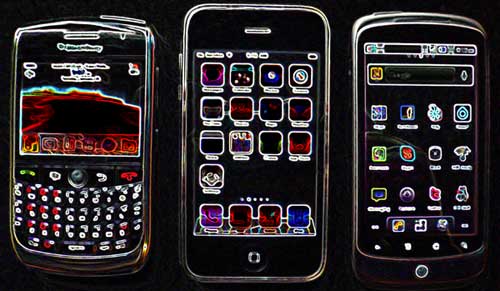Consulting, convening, coding, covering new ground, plus occasional commentary.
Because Android is where the innovation is

I've always been enthusiastic about the promise of the "smart phone." Back in 2004, I couldn't wait to get my hands on the Treo 650 -- the phone of choice for creative multimedia types. At that time, the promised "smartness" fell considerably short of my enthusiasm.
I've been on a journey ever since: from Blackberry, to iPhone, and Android. In fact, I have one of each sitting on my desk right now. "Which one?" you ask, makes it into my pocket each day? Android.
Why? Because Android is where the innovation is.
So, who cares? Another Android vs. iPhone vs. Blackberry opinion? On the surface, probably. However, I feel that underlying this decision is a story of something more worthy of investigation: how innovation often happens in the shadow of something else.
In this case, that something else is Apple's iOS platform. Apple established the user interface patterns, the "App Store" experience, and so on. But then something interesting happened: Apple slowed down. They changed the market, and then they slowed down. They opted to focus on consistency of experience over innovation -- fewer surprises and a front-facing camera vs. anything really new. Somewhere along that path, Android overtook iOS as the most innovative mobile operating system.
I'm musing out load here -- and this is entirely personal opinion -- but I should probably qualify "innovative" a bit. I offer the following as very, very short list of examples:
- FM Tuner App: Android hackers route around Google's complacency and enable FM radio reception capabilities on the Nexus One. These capabilities use the phone's bluetooth radio and a pair of headphones to enhance the reception. More info.
- Android meets Arduino (Amarino): "Amarino is a toolkit to connect Android-driven mobile devices with Arduino microcontrollers via Bluetooth." Want to start the coffee maker from bed in the morning? It's all possible thanks to Android, Arduino, and Amarino.
- CouchDB on Android: Probably the most interesting to me, having recently walked (well, er, crawled) down the road of developing a mobile application, is the potential for robust offline storage on mobile devices. CouchDB is making this possible by taking steps to port their database software to the Android platform. Will it be on iOS one day? As CouchDB developers have stated publicly, "it's more of a political problem than a technical one" (to get Erlang running on iOS).
(All of the above skip over some of the most obvious, user-facing, innovation that Android brought to the phone: integration with social services like Twitter, Facebook, and Gmail, where your contacts' information is augmented with social network data -- this is actually a great example where an open innovation made it to the market first.)
I suspect that there's also an older, more established, trend at work here: The cyclical nature of innovation. It's about ideas like Panarchy that embrace both periods of rapid innovation and periods of creative destruction. In established enterprises, there is often a yin and yang of focusing on new product development for a time, and then moving that product into a "monetization" phase where R&D costs can be recovered. This is all expected, and probably as it should be.
But, and this is an important but: in the Android development community, the rapid innovation and creative destruction are happening simultaneously. This is a unique story. It's perhaps one of the better examples of the pragmatic benefits of "open" vs. closed, in terms of software development and the speed of innovation.
I was listening to Dave Winer as I was writing this, and he repeated the old idiom: "One foot on the train, and one foot on the platform." It resonated for me. With Android, I have both feet planted firmly on the train. The ride might get bumpy from time-to-time, but it's fast and exciting again and, most importantly, my phone is actually getting smarter.
UPDATE: One day after writing this, Google published the upcoming Android 3.0 Platform Highlights that reveal even more innovations that are on route to an Android device near you. The upcoming version is optimized to support devices with a "tablet" form factor.
UPDATE II: A perfect storm this week, as Canalys declares Android "the world’s leading smart phone platform."
About
Hi, I'm Phillip Smith, a veteran digital publishing consultant, online advocacy specialist, and strategic convener. If you enjoyed reading this, find me on Twitter and I'll keep you updated.


Related
Want to launch a local news business? Apply now for the journalism entrepreneurship boot camp
I’m excited to announce that applications are now open again for the journalism entrepreneurship boot camp. And I’m even more excited to ...… Continue reading
Previously
Okay, okay: Sometimes, Toronto is actually pretty awesome
From the future
Awesome Foundation Toronto: We're a hit!